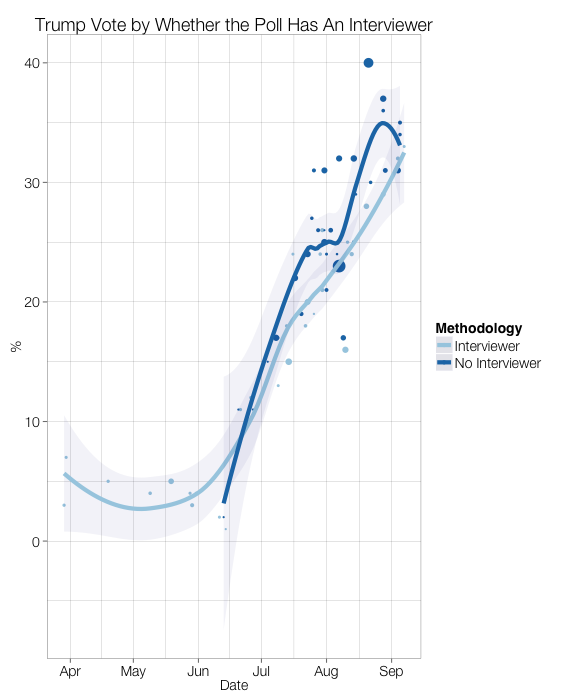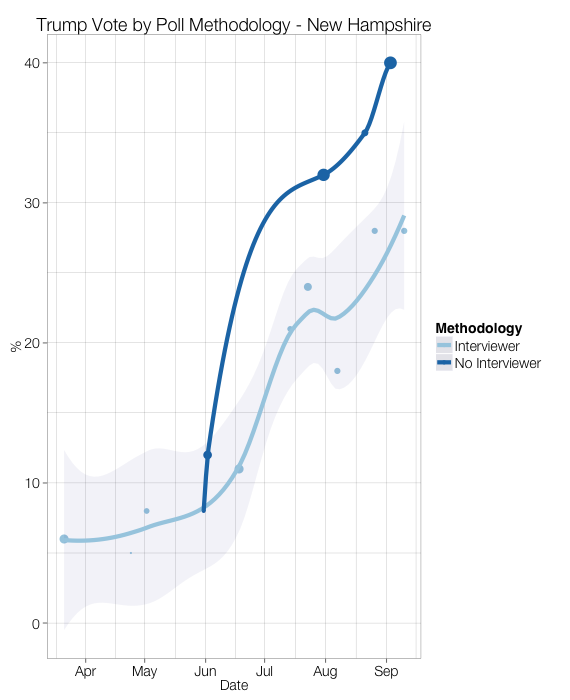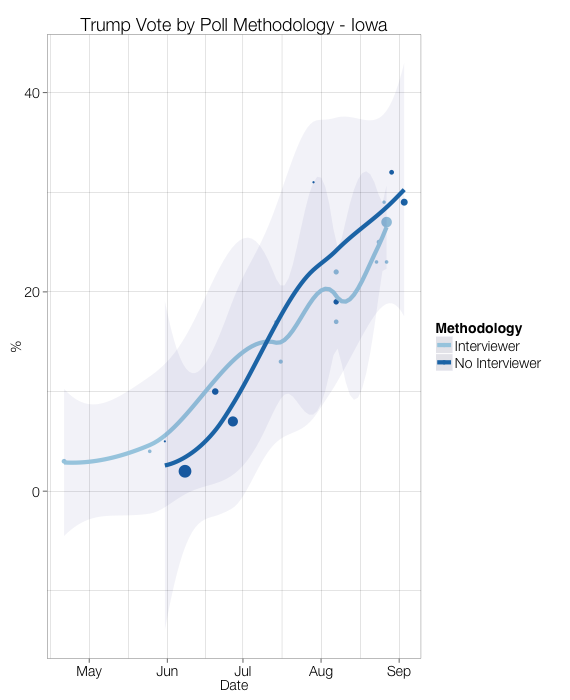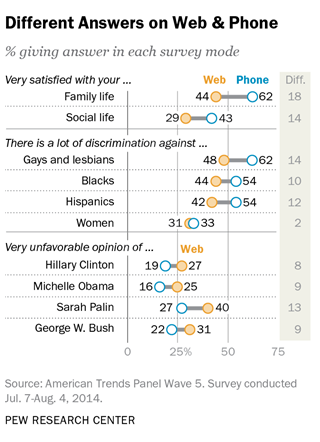
'MODE EFFECT' APPARENT IN TRUMP POLLING - The involvement of an interviewer appears to dampen support for Donald Trump slightly in surveys on the 2016 Republican race, according to a chart prepared by Democratic research analyst Jon Robinson. “Trump support among polls without an interviewer has been anywhere from five to ten points higher than in polls with interviewers since Trump’s rise in the polls began in July,” Robinson writes. No other Republican or Democratic candidate sees their support affected in this way.
Robinson’s chart begins with all national public polls on the Republican race compiled by HuffPost Pollster and divides them into two categories: Those that used live callers for some or all interviewers and those that “had no interviewer whatsoever involved in the process,” including both internet and automated telephone polls. The chart uses a loess regression to plot smoothed trend lines for each category of poll weighted to reflect their sample sizes (with each dot representing a poll and the size of the dot proportional to the number of interviews conducted).
Natalie Jackson, HuffPost’s Senior Data Scientist, modified Robinson’s chart to display bands showing the potential for variation based on random chance alone. The lack of overlap between the two bands throughout much of August indicates a statistically meaningful difference between live interview and automated or internet polls in measuring Trump’s support. (Robinson also produced similar charts for other candidates, although the mode differences for these were not statistically significant).
Jackson also applied the chart format to polls on the Republican race conducted in Iowa and New Hampshire. New Hampshire shows a mode effect similar to the national polls, but the evidence is weaker. There have been only five polls without interviewers released in the state – and these were spread out across the timeline – so the loess routine can’t calculate a confidence interval for that line. Trump’s numbers in Iowa don’t show a clear trend for polls with interviewers compared to polls without interviewers at all. After mid-July the no-interviewer polls show slightly higher estimates for Trump, but the confidence intervals completely overlap for much of that time – which means that statistically speaking there might not be a difference.
Since the polls examined also involve a mix of sampling methods, it is possible that some of the differences reflect differences in the voters sampled and not just differences in the way they were interviewed. That said, as Robinson explains, the differences in polling on Trump is consistent with findings of a study released earlier this year by the Pew Research Center, which found similar patterns in a wide variety of different topics that were based entirely on whether respondents were interviewed with or without an interviewer. These “mode effects” were consistent with theory that respondents sometimes modify their answers because they are interacting with another person.
Robinson: “In the Pew research this showed up in two interesting ways. One, respondents showed less favorable opinions about politicians in general in the online setting than on the phone. They also registered lower levels of satisfaction with family life and were less likely to perceive that certain groups are discriminated against. All three of these question topics are ones where we might expect that being in a social situation with an interviewer (even an anonymous one over the phone) might ‘bias’ a response in the direction of seeming 1) less angry about political leaders, 2) more satisfied with life in general, and 3) holder of less controversial statements than they might reveal otherwise. All of these things exist supposedly because of the perceived (even if it is silent) judgement of an interviewer and it’s exactly what we see illustrated in the graphic below."
The most important question is where the truth lies. The researchers at the Pew Center had no way to determine the accuracy of most of the measures they tested, though as they point out, "previous research examining questions for which the true value is known have found that self-administered surveys generally elicit more accurate information than interviewer-administered surveys." And, of course, votes in primary elections are cast with a secret ballot (party caucuses are an exception, although Iowa's Republican caucuses typically involve paper ballots).
SANDERS POLLING THE SAME AS OBAMA WAS THIS TIME IN 2007: A chart created by Chad Murphy, an associate professor at the University of Mary Washington, which showed Bernie Sanders was polling at the same rate against Hillary Clinton as Barack Obama was polling against her in 2007 drew some buzz on twitter earlier this week.
Sanders' polling might match that of Obama's, but he continues to face disadvantages that Obama did not. For starters, Obama's eventual strong position among black voters in primary states largely helped him win in 2008. Comparatively, a recent YouGov poll shows that Sanders is only capturing 11 percent of black primary voters to Clinton's 53 percent. A Gallup poll of black Americans shows that 80 percent of black Americans are favorable towards her, while just 23 percent are favorable towards Sanders; 33 percent say they're not even familiar with him.
Endorsements also separate Sanders from Obama. This time in 2007, while Clinton had a substantial number of endorsements Obama was able to gather 36 from members of Congress. This cycle, according to The Hill, Clinton has gathered 118 endorsements from members of Congress while Sanders has not received a single endorsement. Fundraising is another issue for Sanders. In 2007, Obama was running nearly even with Clinton on money raised. This cycle, according to FiveThirtyEight, Clinton has captured 73 percent of all the money raised by Democrats while Sanders has only received 23 percent. Additionally, Hillary has immense super PAC power behind her, while Sanders has warded them off.
Does Sanders still have a shot? - Chad Murphy (via email): "The party likes to decide the nominee, and we've seen the establishment firmly behind Hillary in a way they weren't in 2007. That being said, we're seeing a clear rejection of the party favorites on the Republican side, and we may be seeing something similar happening for the Democrats as well….And if Hillary's inevitability starts to disappear, we might see the party loyalists searching for someone new."
WHAT'S HAPPENING HERE 'AIN'T EXACTLY CLEAR' - Republican pollster Glen Bolger: "Donald Trump and Bernie Sanders are, to quote Dennis Green, who we thought they were. Instead, it is the voters who are driving this. And, that’s who Republican members of Congress need to focus on – not the candidates in the Presidential race, but the voters who are angry and unhappy with the direction of the country.The current discontent is the result of eleven straight years of wrong track pessimism in national polling. This is the longest period of pessimism ever measured. The status quo – which by and large means incumbents – is something voters are weary of. There is also a sense that while Americans are working harder than ever, they are treading water financially. They believe the deck is stacked against them by politics and politicians, big business and bankers, the media, and other American AND world institutions. Problems are going unsolved, whether it is the border, the economy, the War on Terror, the cost of higher education, and others. his has created a political environment that encourages primary challenges and election upsets." [Public Opinion Strategies]
A NOTE ABOUT HUFFPOLLSTER'S CHART UPDATE OUTAGE - We know the unexpected interruption of our chart updates for the last few days has been frustrating. We apologize for the inconvenience. The problem involved a web server glitch that, as of this writing, is nearly resolved. We expect to have the charts fully updated by late this afternoon.
THIS WEEK'S POLLS
-Bernie Sanders leads Hillary Clinton in New Hampshire by 22 points and Iowa by 10 points. [Huffington Post, CBS]
-Sanders is slightly ahead of Clinton in a MassInc. New Hampshire poll. [WBUR]
-Clinton loses GE support as Donald Trump and Ben Carson continue to rise. [ABC]
-The polling gap between Clinton and Sanders narrows. [CNN]
-Carson gains on Trump in the GOP primary, with just 4 points separating the two in a CBS/NYT poll. [HuffPost]
-Donald Trump and Ben Carson lead among California Republicans. [LA Times]
-Americans aren't all that comfortable with taking in Syrian refugees [HuffPost]
-Republican voters increasingly see Trump as their best shot at winning the presidency. [NYT]
-Trump's favorability is up among Republican voters. [YouGov]
-Support for Clinton drops among white female voters. [HuffPost]
HUFFPOLLSTER VIA EMAIL! - You can receive this weekly update every Friday morning via email! Just click here. Enter your email address, and click "sign up." That's all there is to it (and you can unsubscribe anytime).
THIS WEEK'S 'OUTLIERS' - Links to the best of news at the intersection of polling, politics and political data:
-Attention paid to the election remains low; just 27 percent of Americans say they're following the election very closely. [HuffPost]
-Bernie Sanders continues to struggle with name recognition. [HuffPost]
-Hillary Clinton's decline in favorability has accelerated in the last two months. [NYT]
-Clinton would lose support more than other candidates if Joe Biden enters the primary race. [WashPost]
-Nate Silver finds virtually all recent coverage of Clinton focused on email, polls and a potential Biden candidacy. [538]
-An Iowa blogger dives deep into past polling surprises in the Iowa Caucuses. [Bleeding Heartland]
-John Sides explores whether anger and dissatisfaction with politics explain the surges in support for Trump and Sanders. [WashPost]
-Lynn Vavreck reviews YouGov data on which Republican candidates were hurt most by Donald Trump’s rise. [NYT]
-Marc Ambinder lists five things you need to know to better forecast the 2016 election. [538]
-Sean McElwee lays out a case for why the differing demographics of voters and non-voters affects democracy. [The Atlantic]
-Sara Kehaulani Goo notes that many Americans aren't able to read a scatter plot graph. [Pew Research]
-Karlyn Bowman reviews the numbers on insider and outsider candidates. [Forbes]
-The Roper Center polling archive finds a new home at Cornell University. [Roper]



